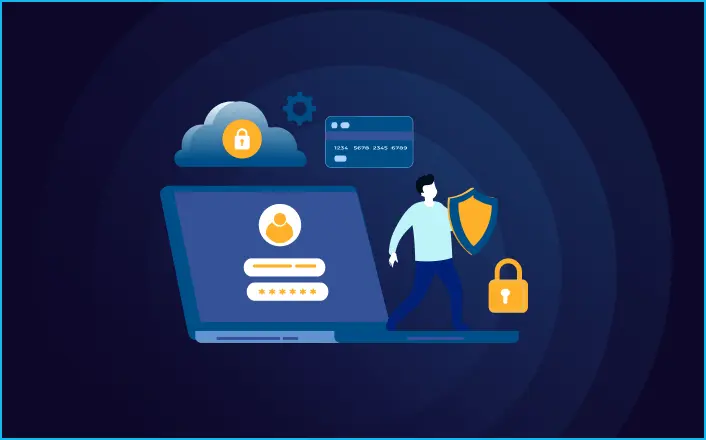- Product
-
Solution
-
By Industry
Cybersecurity solutions tailored to your industry’s needs.
-
- Resources
-
Books
Our ultimate guides and playbooks
Solution Briefs
Overview of PureDome’s functionality
-
Quizzes
Assess your cybersecurity readiness
Case Studies
PureDome customer success stories
Newsletter
Subscribe to the PureDome newsletter
-
- About Us
- Partner
- Pricing
- Download
Business VPNs: Safeguarding Cloud Data and Managing Access
-
Sharmeen Saleem
-
30 Jan 2024
- 4 min read


Cloud security poses significant challenges for modern businesses. These companies heavily rely on SaaS applications for data storage, transaction processing, and collaboration tasks. While cloud computing offers numerous advantages, such as cost reduction, productivity enhancement, and flexibility, security teams face the complex task of safeguarding SaaS applications to ensure data remains protected.
Many cloud security strategies are centered around Virtual Private Network (VPN) protocols and IP anonymization. While traditional VPNs play a role, they may need to provide more protection for cloud assets. In this blog, we will evaluate the effectiveness of VPNs in safeguarding cloud resources and explore how cloud VPNs combine access management and encryption to secure business-critical applications.
What is a Business VPN?
Virtual Private Networks are designed to conceal web traffic from external observers. These networks employ tunneling protocols to encrypt data at its source, ensuring it remains encrypted until it reaches its destination. This encryption minimizes the risk of interception or data breaches. VPNs operate atop existing networks and direct data through private servers, which assign new IP addresses to the data passing through them, effectively anonymizing users and making them challenging to identify.
Do VPNs Provide Adequate Cloud Security?
Conventional VPNs do provide a certain level of security for cloud assets, primarily due to the following reasons:
Network Concealment:
A secure VPN can hide network resources effectively. Companies can allocate users to virtual networks with access to specific applications while keeping other network resources off-limits and essentially invisible.
Imprecision:
VPNs may not offer the precision required to protect cloud resources adequately. User needs can vary widely from one team to another, with some employees requiring access to customer data and others needing secure access to marketing materials. Granular privilege management is essential to tailor access to each individual, a feature not typically provided by legacy VPN solutions.
Data Encryption:
VPNs use encryption to protect data, employing protocols like IPSec or OpenVPN. These protocols make it extremely difficult to decode data without the encryption key, providing basic privacy and security for data packets traveling through an encrypted VPN tunnel.
However, even the most secure VPNs for business may have security vulnerabilities, particularly when safeguarding cloud assets. Some of the security challenges related to VPN setups include:
Impracticality:
Corporate network segmentation with standard business VPNs can take time and effort. Users may need to access multiple VPNs to reach various applications, leading to traffic bottlenecks as data travels from remote workstations to SaaS portals and VPN data centers. Traditional VPNs may also need help to scale effectively in cloud-dependent environments, making managing numerous cloud apps overwhelming.
Vulnerability to Intrusion:
Attackers who gain access credentials for a single user can access critical network resources. While VPNs effectively protect network perimeters, they may lack granular protection against lateral movement within networks. If cyber attackers breach network boundaries, tunneling protocols alone may not prevent data loss.
In conclusion, while VPNs play a role in securing cloud assets, they may have limitations that hinder their effectiveness in specific scenarios. Companies must carefully assess their security requirements and consider more advanced solutions to address the specific challenges posed by cloud security.
The Role of Cloud-Based VPNs in Enhancing SaaS Security
It's essential not to dismiss secure VPN technology when addressing security concerns for cloud assets. Cloud-based VPNs effectively cater to the requirements of SaaS users, offering a balanced blend of user experience and security.
These VPNs are hosted within the cloud itself, a setup that comes with several security advantages:
Cloud-Based Existence:
With cloud-based VPNs, there's no need for companies to maintain physical VPN hardware. Instead, cloud providers manage data centers and VPN routers near cloud resources, delivering a more efficient solution.
Global Accessibility:
Cloud-optimized software establishes a privately administered network accessible from anywhere. Employees can install VPN clients and log in using their personal devices (BYOD) or company-issued ones. Once connected, VPNs establish secure connections to the required SaaS resources.
Access Control:
Cloud VPN solutions combine network access with Identity and Access Management (IAM) tools. Client gateways scrutinize users, allowing only those with the appropriate privileges to access relevant cloud resources. This data access control increases the overall network security.
Seamless Scalability:
SaaS-optimized VPNs can quickly scale to accommodate new users. New users simply need to download client tools, while security teams create profiles containing their access privileges. Additionally, this protection remains in place regardless of where users are located, a crucial feature for today's distributed workforce.
Data Policies:
Older VPN services often impose limitations on data usage and may charge more for users with high data requirements. In contrast, cloud VPNs are generally less restrictive, making them an excellent choice for SaaS users dealing with substantial volumes of business data.
Secure SaaS Assets:
VPNs sometimes need help managing the combination of on-premises infrastructure, remote devices, and SaaS applications. Next-generation cloud-based VPNs for businesses offer a solution that aligns with the needs of modern, agile businesses.
-Jan-30-2024-09-39-02-9629-AM.webp?width=1728&height=836&name=cover%202%20(1)-Jan-30-2024-09-39-02-9629-AM.webp)
What are the Alternatives to VPNs To Secure Digital Assets?
When safeguarding cloud assets, VPNs for businesses are only one of the security options available. There are alternative methods to secure the connections between corporate networks and SaaS applications:
Zero Trust Network Access (ZTNA):
ZTNA tools authenticate users but impose more comprehensive protections as users navigate within the network. In a ZTNA setup, users can access resources based on strict permissions, severely limiting east-west movement across the network and making it challenging for data theft attempts.
Identity and Access Management (IAM):
IAM can serve as an alternative to VPNs. IAM or PAM (Privileged Access Management) operates in a similar fashion. Employees utilize sign-in portals located at the network edge. IAM tools compare user credentials with centrally stored data and grant access only to authenticated users. Adding Multi-Factor Authentication (MFA) enhances IAM security, requiring users to provide two or more credentials, often involving biometric scans or access cards. MFA typically restricts access to legitimate users.
SD-WAN (Software-defined Wide Area Networks):
SD-WAN solutions can be part of SASE and ZTNA systems and function independently. SD-WAN operates across networks like VPNs, routing traffic, authenticating users, and governing access to third-party SaaS resources.
Secure Access Service Edge (SASE):
SASE presents another alternative to VPNs. It secures every network endpoint, with next-generation firewalls and software-defined perimeters defining resource access for each user. Similar to ZTNA, SASE configurations tightly control network movement.
It's important to note that SASE and ZTNA solutions are highly intricate and may require substantial assistance from third-party providers. For small and medium-sized businesses, VPN-based cloud protection might be preferable, as it offers agility, speed, ease of configuration, and security. While some granular control might be sacrificed, cloud-optimized VPNs seamlessly integrate with SaaS and are more straightforward to scale compared to SASE.
Secure Your Resources with PureDome
SaaS applications enhance business operations by promoting collaboration, reducing data and software storage costs, and providing flexibility. However, they do not inherently guarantee security. Robust cloud security systems are essential to protect data, and VPNs should be a crucial component of these systems.
PureDome offers adaptable VPN solutions designed for businesses relying on cloud services. Our cloud-optimized VPN services secure data flows from remote workstations to SaaS servers. With PureDome, you can establish agile VPN setups tailored for the cloud, effectively reducing the risk of data breaches.
Contact us today to explore VPN solutions tailored to your unique requirements.
Frequently Asked Questions
What is the role of VPNs in securing cloud assets?
Business VPNs are crucial in securing cloud assets by establishing encrypted connections between devices and cloud resources. They encrypt data, making it unreadable to unauthorized parties, and provide secure access to cloud-based applications and data, ensuring data remains private and protected.
Are there alternatives to VPNs for cloud security?
Yes, there are alternatives to VPNs for cloud security. Some alternatives include Identity and Access Management (IAM), Zero Trust Network Access (ZTNA), Secure Access Service Edge (SASE), and Software-Defined Wide Area Networks (SD-WAN). These solutions offer different approaches to securing cloud assets and controlling user access.
How can Identity and Access Management (IAM) enhance cloud security?
Identity and Access Management (IAM) enhances cloud security by controlling user access to cloud resources through authentication and authorization. IAM verifies user credentials and grants access only to authenticated users with the necessary privileges. Multi-factor authentication (MFA) can strengthen IAM security by requiring multiple forms of authentication.
What are the advantages of using PureDome business VPN for securing cloud resources?
PureDome business VPN offers several advantages for securing cloud resources. It provides agile, fast, and easy-to-configure VPN setups, enhancing security, protecting data flows from remote workstations, and reducing the risk of data breaches.
Stay up to date with the latest cybersecurity insights and best practices
Get the latest information, stories, and resources in your inbox. Subscribe for monthly updates.
Securing 1000+ Businesses Across The World